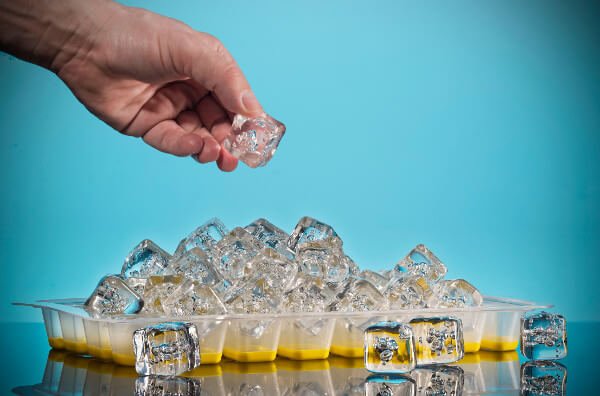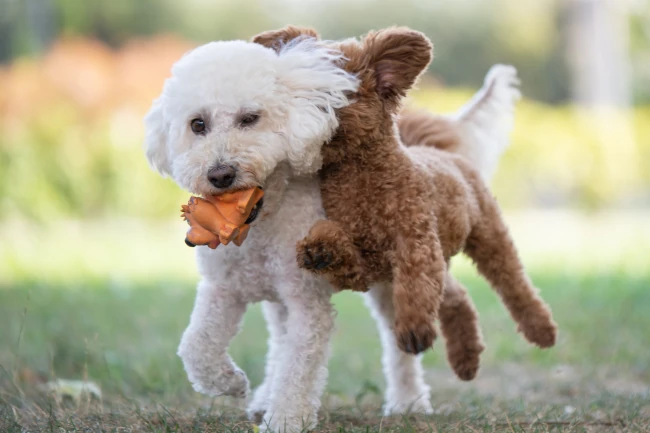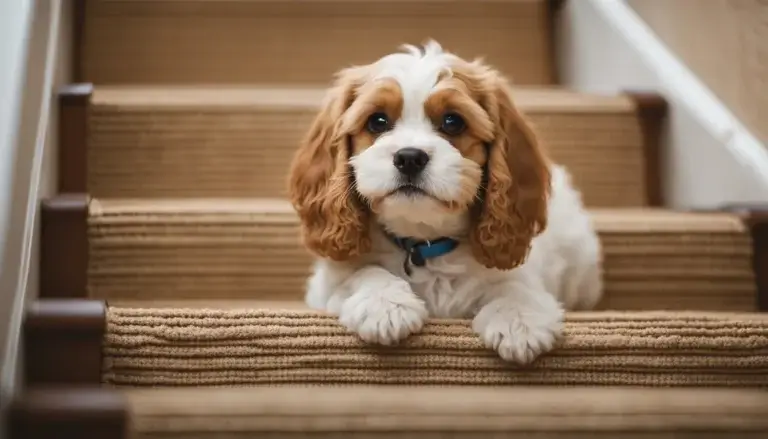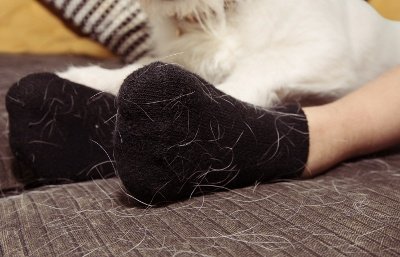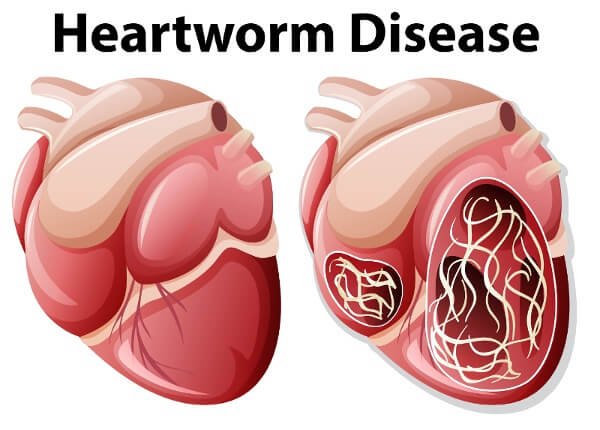Why Does My Cavapoo Eat Poop?

Before I begin, let me preface this post by saying that I consider myself a very experienced dog owner as I have owned dogs for over 40 years.
Why would your Cavapoo eat poop?
I’ve handled an array of issues over the years: stubborn chewing habits, anxiety during thunderstorms, digging, excessive barking, sleepless nights, separation anxiety – you name it, and I’ve probably dealt with it.
However, a couple of months ago, my adorable Cavalier, Tucker, picked up a habit that took me completely by surprise – eating poop.
Yes, you read that right.
My cuddly, handsome boy started eating his feces.
My initial reaction was, of course, sheer disgust, swiftly followed by alarm.
Is my dog sick? Is this normal?
What could lead Tucker to develop this unsavory habit?
Like any concerned pet parent, I began to search for answers.
Why Would a Cavapoo Eat Poop?
This behavior is officially known as coprophagia.
It’s more common than one might think, particularly in puppies.
It can be motivated by various reasons, some innocent, others a cause for concern.
Reasons Why Your Cavapoo Eats Poop
It’s important to understand that there’s a whole host of reasons why a dog might decide to snack on their own or another animal’s waste.
Remember, dogs don’t think about these things the same way we do.
It’s not a matter of good taste; it’s more about instinct, curiosity, or even necessity.
Here are some potential causes for your dog’s coprophagia:
1. Parasites: Internal parasites can sap nutrients from your dog’s system, which might lead them to try to supplement their diet in unappetizing ways.
Regular deworming and check-ups are crucial to rule out this possibility.
2. Stress: Yes, our canine companions can feel stress too!
A major change in a dog’s life – such as moving, adding a new family member, or even changing the brand of their food – could stress them out, causing unusual behaviors like coprophagia.
3. Cleanliness: Dogs might eat feces to keep their environment clean.
This is especially true for mother dogs, who naturally clean up after their puppies to keep their den clean and free from attracting predators.
4. Boredom: When dogs don’t get enough mental and physical stimulation, they can resort to unusual activities to keep themselves entertained.
Unfortunately, poop-eating can be one of them.
5. Learned Behavior: Dogs learn a lot from watching other dogs.
If your pooch sees another dog (or even a cat) doing this, they might decide to give it a try themselves.
6. Hunger: If your dog feels hungry or isn’t getting enough to eat, they might resort to eating feces.
7. Medication Side Effects: Some drugs can increase your dog’s appetite, leading them to eat things they ordinarily wouldn’t, including feces.

Why Was Tucker Eating Poop?
Tucker’s sudden interest in feces had me worried.
He had always been on a balanced diet, with all the nutrients he needed, and there hadn’t been any drastic changes in his diet or lifestyle.
I immediately booked an appointment with our vet.
After a series of tests, we ruled out any medical conditions. Phew!
That was a relief, but it still left us with the question – why was Tucker eating poop?
Our vet suggested it might be behavioral and advised trying to modify Tucker’s behavior.
Armed with patience and lots of treats, I started the somewhat daunting task of training Tucker out of this habit.
Every time Tucker and I went out for a walk, I kept a very close eye on him.
Whenever he seemed like he was about to indulge in his newfound delicacy, I’d firmly say, “No,” and distract him with a favorite toy or treat.
It was challenging at first, and there were certainly times when I doubted our progress.
But consistency is key in behavior modification, and so I persisted.
We also added more mental stimulation to Tucker’s daily routine.
More toys, more playtime, and more interactive activities kept him occupied, leaving him less likely to seek out additional “stimulation”.
Regularly cleaning up after him was crucial too.
By removing the temptation, we could further discourage the behavior.
As days turned into weeks, I started to notice a gradual change.
The instances of Tucker trying to eat poop decreased.
I kept up with the routine, rewarding him for good behavior, and slowly but surely, the habit ceased.
It’s been a month since Tucker’s last episode of coprophagia.
Our persistence, coupled with the vet’s guidance, has worked wonders.
It was an alarming and challenging phase, but we got through it together.
To anyone dealing with this unfortunate habit in their furry companions, I want you to remember this: it’s a bump in the road, not the end of the journey.

How To Stop Your Cavapoo Eating Poop
As challenging as it may be, there are plenty of other methods to help curb your dog’s coprophagic tendencies.
Here are some additional strategies I’ve come across during my poop-busting mission:
1. Consider Dietary Supplements: Various dietary supplements can make your dog’s feces less appetizing.
These contain certain enzymes or ingredients that, once passed through the digestive system, discourage your pup from eating their waste.
Always consult with your vet before starting any supplement regimen, though, to ensure it’s safe and suitable for your specific pet.
Some owners have had great success adding pineapple to their dog’s diet to stop them from eating poop.
I did not try this but it’s worth considering.
2. Increase Your Dog’s Fiber Intake: A diet high in fiber can help make your dog feel fuller, reducing their interest in snacking on their feces.
Fiber can also help in maintaining bowel health.
High-fiber vegetables like green beans or pumpkin are generally safe and healthy for dogs, but, again, always check with your vet before changing your pet’s diet.
3. Training Tools: If you have a stubborn poop eater, sometimes you may need to consider a more assertive approach.
Using a leash during walks can provide more control, allowing you to swiftly steer your pup away from any tempting ‘snacks’.
If your dog usually does their business in your yard, a long training lead can also give them some freedom while still allowing you to intervene when necessary.
4. Behavioral Training: This goes beyond simply distracting or stopping your dog when they start eating poop.
Consider teaching commands like “leave it” or “look at me.”
These commands can be useful in various situations and are invaluable in managing coprophagic behavior.
5. Exercise and Enrichment: A tired Cavapoo is a well-behaved dog.
Regular exercise and mental stimulation can reduce boredom, a common reason behind many unwanted behaviors.
Plus, the more tired your dog is, the less likely they’ll be interested in exploring their poop.
6. Keep a Clean Environment: This one might seem obvious, but it’s worth reiterating.
Regularly clean your yard or wherever your Cavapoo tends to poop.
If there’s no poop around, the temptation to snack is effectively eliminated.
I clean up poop at least twice a day, sometimes three times if needed.
Not only does it stop Tucker from eating the poop but it also is more hygienic.
Here are my recommendations for poop scoopers.
7. Consult a Pet Behaviorist: If you’ve tried everything and your dog’s poop-eating habits persist, it might be worth consulting with a certified pet behaviorist.
They can provide professional insight into why your dog might be continuing this behavior and offer personalized solutions.

Final Thoughts
Overcoming coprophagia can be a test of patience, but with perseverance and the right approach, you can guide your Cavapoo away from this unpleasant habit.
Remember, every dog is unique, so what works for one might not work for another.
A healthy dose of patience, consistent training, and perhaps a little trial and error, will help you discover the best solution for your Cavapoo.
I hope this post brings some comfort to anyone else facing a similar situation

